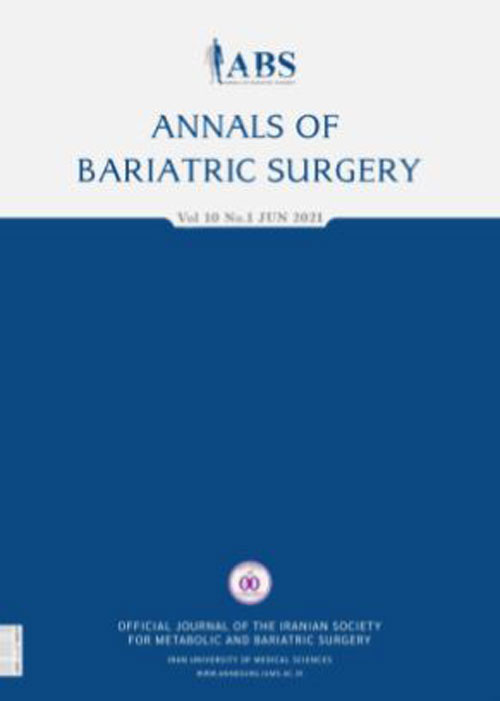فهرست مطالب

Annals of Bariatric Surgery
Volume:9 Issue: 1, Winter and Spring 2020
- تاریخ انتشار: 1399/12/06
- تعداد عناوین: 8
-
-
Pages 1-4
Obesity and obesity related comorbidities are increasing worldwide. Bariatric surgery plays a key role in treatment of morbid obesity and its related diseases. Bariatric procedures have been evolved in decades from initial procedures to modern and standard procedures. This evolution is continuing now to reach better and more persistent results with lower complications’ rates. In this manuscript we tell a brief history of this development.
Keywords: Obesity, Bariatric surgery, History, Obesity surgery -
Pages 5-9Background
Obesity is the most common human metabolic disorder that causes many complications for patients worldwide. On the other hand, Sleeve Gastrectomy is one of the bariatric surgeries that are used by surgeons in morbid obese patients to treat obesity. The aim of this study was to survey on results of Sleeve gastrectomy and its subsequent complications among Iranian patients.
MethodsThis is a case series study in which data of 92 morbid obese patients were gathered. Patients were followed up at intervals of 1.5, 3, 6, 12, and 18 months after operation. History of post-operative complications, appetite and satisfaction were taken from patients, physical examination was performed as well as measuring weight and BMI in follow-up visits. Ultrasonography was performed in 6, 12 and 18 months after the surgery for assessing gallbladder.
ResultsMean BMI (body mass index) was 45.43 (± 8.41) kg/m2 in patients. Mean BMI reduction was respectively 4.5 (±1.12), 9.03 (±2.44), 13.45 (±3.45), 17.57 (±4.66), 19.82 (±5.78), 17.57 (±4.66) and 19.82 (±5.78) kg/m2 at 1.5, 3, 6, 12, and 18 months after operation, respectively. Mean weight loss was 71.5% 18 months after operation.
ConclusionsCurrent study reveals that Sleeve Gastrectomy is an effective method of bariatric surgery in which patients encounter a small number of side effects, and, also, is highly recommended for morbid obese patients.
Keywords: Morbid obesity, Sleeve Gastrectomy, BMI, weight loss -
Pages 10-17
In this study, we aimed to evaluate the effect of bariatric surgery on constipation followed by the surgery.This prospective cohort study included 237 patients with morbid obesity, who were candidate for Laparoscopic Roux-en-Y Gastric Bypass (RYGB), and One-Anastomosis Gastric Bypass (OAGB) in Obesiyt Clinic of Rasoul Akram Hospital, Tehran, Iran, 2012-2014. The severity of constipation was measured by Wexner Constipation Score (WCS) before and three months after the surgery. Paired t-test, Mc Nemar test, and logistic regression were applied for the analyses. Mean age and BMI of the 237 patients were 31.59±5.92 years and46.59±5.81kg/m2, respectively. Mean WCS decreased significantly in OAGB group (3.1±4.27 vs. 4.72±4.81, P=0.003), while the reduction in WCS mean score was not significant in RYGB group (4.5±4.73 vs. 4.63±5.19, P=0.793). The proportion of constipation reduced (48/103 vs. 32/103) significantly in OAGB group (P=0.002). Conversely, the decrease in this proportion (from 58/134 to 57/134) was not significant in RYGB group (P=0.06). Considering the confounding role of diet and supplementary intake of the patients, the results of this study showed that the frequency of constipation reduced in morbidly obese patients undergoing obesity surgery and postoperative nutritional recommendations. The comparison between techniques showed that OAGB reduced the constipation score and proportion, while this decrease was not significant in RYGB.
Keywords: Morbid obesity, Gastric bypass, Bariatric surgery, Constipation, Wexner -
Pages 18-27Background and aims
We aimed to summarize earlier studies on the effects of different types of bariatric surgeries on resting metabolic rate (RMR), resting energy expenditure (REE), and basal metabolic rate (BMR). The aim of this study was to determine the effects of bariatric surgery on the pulmonary function in the morbid obese patients.
MethodsWe searched PubMed, SCOPUS, Web of Science, and Cochrane from inception to October 2020 using relevant keywords.
ResultsOverall 13 studies were included. Pooled effect size suggested a significant effect of bariatric surgeries on REE (Weighted mean difference (WMD): -360.11, 95% CI: -446.67, -273.55, p < 0.0001; I2 = 69.6%), RMR (WMD: -228.05, 95% CI: -290.70, -165.41, p < 0.0001; I2 = 0%), and BMR (WMD: -551.59 mg/dl, 95% CI: -696.25, -406.92, p < 0.0001; I2 = 5.9%).
ConclusionTaken together, the data suggest that bariatric surgeries have beneficial effects to reduce REE, RMR, and BMR.
Keywords: Bariatric surgeries, Metabolic rate, Obesity -
Pages 28-31Background and Aims
Cardiac remodeling and functions are affected after laparoscopic sleeve gastrectomy (LSG); although, the degree of the LSG impression on cardiac function is unclear. The purpose of this study was to determine the effect of LSG on echocardiographic factors in morbidly obese patients.
MethodsIn this prospective study, patients with morbid obesity who underwent LSG in Loghman Hakim Hospital, Tehran, Iran in 2017 were evaluated. Echocardiographic parameters such as ejection fraction (EF), left ventricle (LV) diastolic function, LV mass, LV mass index, epicardial fat (EPF), and valvular heart disease including mitral regurgitation (MR), mitral stenosis (MS), aortic regurgitation (AR) and aortic stenosis (AS) were evaluated before and after LSG. All of the data were entered into SPSS software and were analyzed by statistical tests. P values of less than 0.05 was considered significant.
ResultsNinty (90) patients were enrolled in this study. The EF (P=0.012), LV diastolic function (P=0.0001), valvular heart disease (P=0.0001), and LV mass (P=0.002) were significantly improved after LSG. The EPF and LV mass index had no significant difference before and after surgery (P > 0.05).
ConclusionLSG would have significant effects on echocardiographic factors and cardiac remodeling in patients with morbid obesity.
Keywords: Sleeve Gastrectomy, Echocardiography, Morbid obesity, Bariatric Surgery, Overweight -
Pages 32-35Background
Obesity implies a large body fat, because of the high prevalence and physical and psychological consequences, today it becomes a serious crisis in most countries. Cognitive behavioural Therapy along with diet and exercise methods, considered as lifestyle modification techniques that are used in the treatment of obesity. It seems that change behaviour eating and associated thought patterns are necessary as a positive health step in the country.
MethodsThis research is semi-experimental method with pre-test and post-test, experimental and control groups and follow up to a month, on 20 women suffering from obesity, Type A (BMI = 30-34.9), referred to an obesity clinic of Rasoul Akram Hospital in Tehran. The intervention consisted of 12 sessions of 2 hours of cognitive – behavioural group therapy, which the experimental group was given during 6 weeks. Data through of body mass index (BMI) were collected and follow-up one month after treatment variable BMI, have been done. Data was analysed by SPSS-20 software and descriptive statistics and inferential statistics (analysis of covariance) was used for data analysis.
ResultsResults of covariance analysis showed that the post-test and follow-up at one month compared with the control group not showed a significant decrease in the amount of BMI. The average weight loss for both groups was closer together.
ConclusionIt seems the effectiveness of this treatment in reducing the multi-month and multi-year long-term follow-up BMI should be examined.
Keywords: Cognitive behavioural Group Therapy, Body Mass Index, BMI, Obese -
Pages 39-40
Internal hernia after laparoscopic Roux-en-Y gastric bypass (LRYGB) surgery can lead to small bowel obstruction or chronic recurrent abdominal pain. We present internal hernia (IH) in a 31-year-old man who underwent RYGBP 4 years ago, presented with upper abdominal pain.
Other than that, a physical examination, upper gastrointestinal endoscopy, imaging and laboratory workout did not reveal any pathological finding. And an abdominal CT was inconclusive. Immediate diagnostic laparoscopy was performed and an internal intestinal herniation was diagnosed, where the common channel herniated through the mesojejunal space. The conversion to upper midline minilaparotomy was necessary for hernia reduction in our case. No bowel resection was required and both patients fully recovered.Keywords: Gastric bypass, internal hernia, mesojejunal space


